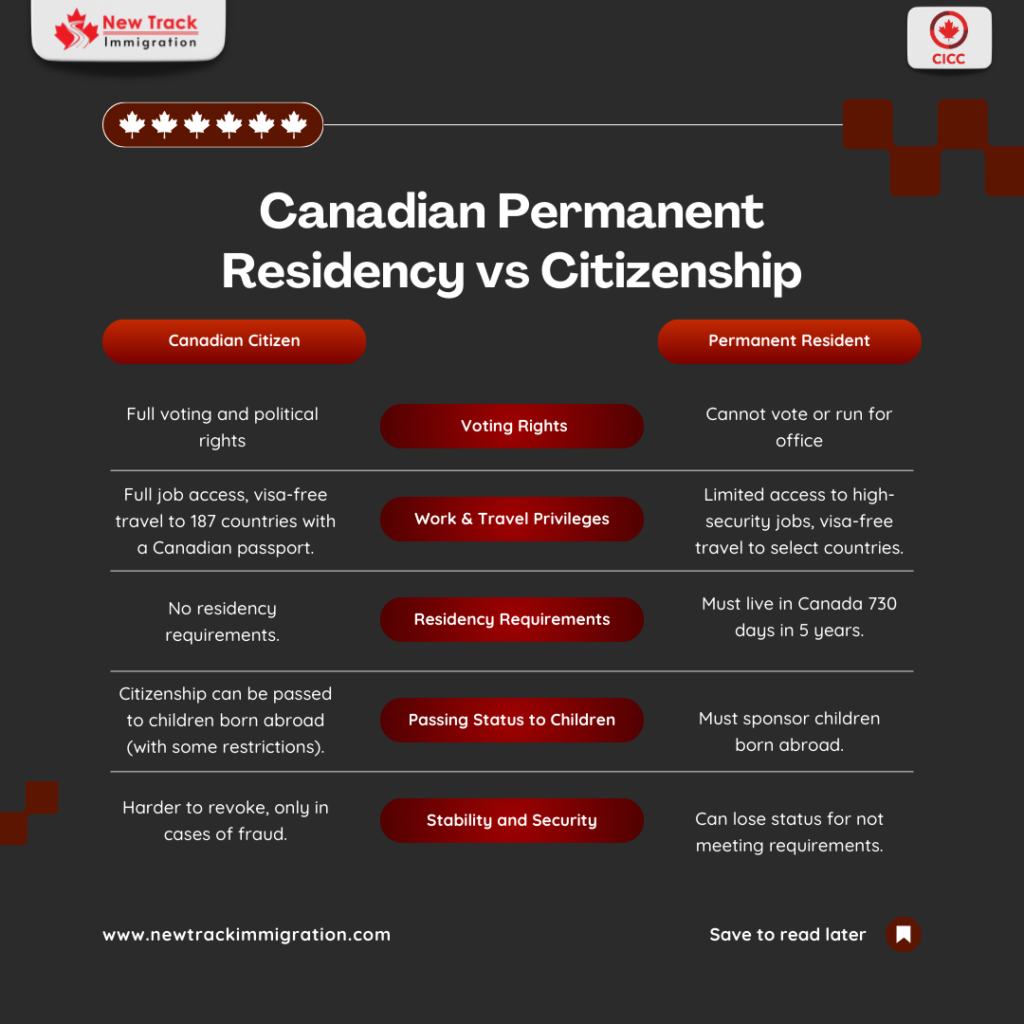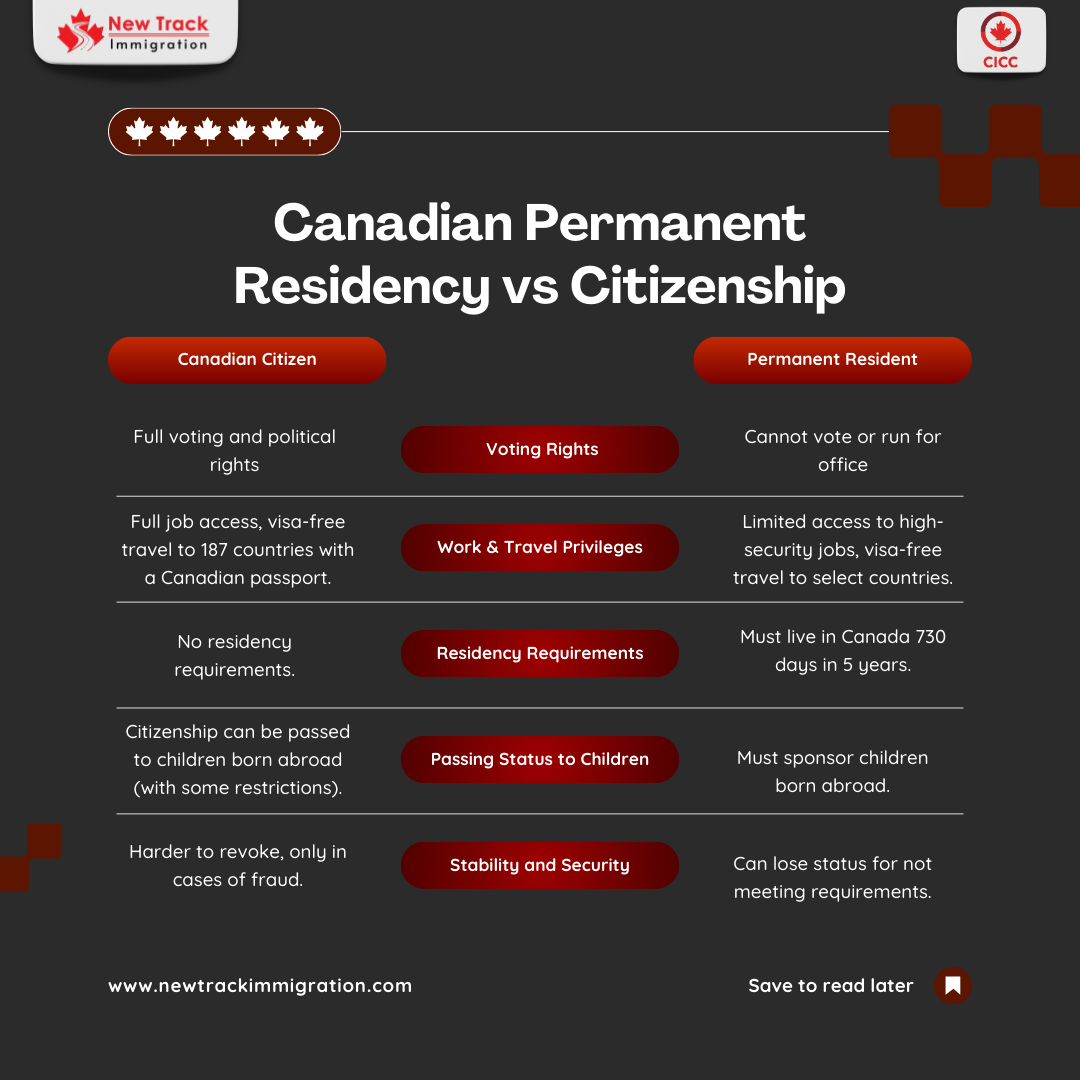Canadian Permanent Residency vs Citizenship | Rights, Benefits, Limitations: In Canada, both permanent residents and citizens enjoy many benefits, such as the ability to live, work, and study in the country. However, some key differences make them both distinct. Understanding these differences can help individuals make informed decisions about their future in Canada. Let’s explore the rights, benefits, and limitations of Canadian Permanent Residency compared to citizenship.
Canadian Permanent Residency vs Citizenship

Voting Rights in Canada
One of the most significant differences between Canadian Permanent Residency and citizenship is the ability to participate in the country’s democratic process. Permanent residents cannot vote or run for political office, meaning they do not have a role in shaping the country’s leadership and policies. In contrast, Canadian citizens can vote in elections and run for public office, giving them a more active role in the country’s governance.
Work and Travel Privileges
Both permanent residents and citizens can live and work in Canada without restrictions. However, there are certain jobs that permanent residents cannot take. These include roles that require a high-level security clearance. Citizens face no such limitations. When it comes to travel, the PR card benefits in Canada include the ability to travel with ease, but it is not as powerful as a Canadian passport. Canadian Permanent Residency allows holders to travel visa-free to select countries, but Canadian citizens with a passport can travel visa-free to 187 countries as of 2024. This passport also allows you to apply for dual citizenship and access Canadian legal assistance overseas.
Residency Requirements for PR Status
Another key difference is the residency requirement. Permanent residents must be physically present in Canada for at least 730 days in five years to maintain their status. Failure to meet this requirement can result in the loss of Canadian Permanent Residency. However, citizens have no such restrictions. Once granted Canadian citizenship, individuals can live abroad for any length of time without losing their status.
Sponsoring Children as a Permanent Resident
When it comes to passing status to children, permanent residents and citizens face different rules. Children born in Canada to permanent residents are automatically granted citizenship. However, if permanent residents have children abroad, they do not automatically pass their status to the child. They must apply to sponsor their children and meet certain requirements. Canadian citizenship, on the other hand, can usually be passed to children born outside the country. However, the first-generation limit restricts citizens born abroad from automatically passing citizenship to their children. The Canadian government is considering changes to this rule, which could allow citizens born abroad to pass citizenship to their children under specific conditions.
Stability and Security
The stability of citizenship is another key distinction. Permanent residents can lose their status if they fail to meet residency requirements or become inadmissible due to criminal activity. In contrast, citizenship is much harder to revoke. It can only be revoked in cases of fraud or misrepresentation during the application process, making Canadian citizenship a more secure option for those looking to live in Canada long-term.

See more:
- IRCC 2024 Work Permit Extension Policy for PNP Candidates
- Low-Wage LMIA Processing Suspension for TFWP in some cities
- Positive Economic Benefits Continue for Express Entry Candidates
Conclusively, while both Canadian permanent residency and citizenship offer many privileges, there are notable differences. The ability to vote, hold certain jobs, and travel freely are some of the primary distinctions. Additionally, citizenship provides greater stability and more options for passing status to children. Whether you choose Canadian Permanent Residency or citizenship depends on your long-term goals in Canada.
Reach us at:
Schedule an appointment with us HERE to connect with a licensed RCIC immigration consultant today. We’ll guide you through every step.
Ready to take the next step in your Canadian journey? Contact New Track Immigration today to explore your options for permanent residency or citizenship and get personalized guidance from our experts!









